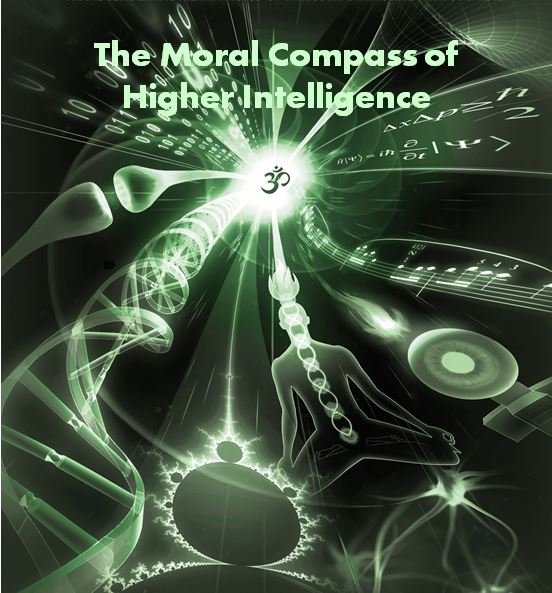
In this essay I will explore to what extent we can avoid suffering by avoiding purposefully deceiving others. Truth is a difficult topic. On Steemit I have often seen people post about "The Truth" and they derive therefrom a kind of peculiar attitude of authority as regards moral issues. It seems that they claim to know an absolute metaphysical Truth, a higher perspective on reality, which I am afraid does not fall within the experiential reality of normal persons like you and me. In this essay I will challenge such absolute notions, but at the same time I will try to advocate a pragmatic attitude towards reality which I call "truthful intent", which is a way of respecting subjective truth, but only in as far as it reduces suffering.
Background
In my previous series "Is Intelligence an algorithm", chapter 3, I already discussed the issue of "Truth" to a certain extent. For the purpose of this article it is important to repeat this analysis:
Quote: "Truth as we experience it is a relative and subjective concept. For each event, different beholders have a different narrative which is often blurred by interpretations and coloured by beliefs and emotions. The same event can be told from very different perspectives, which at first glance appear contradictory and even mutually exclusive, but which in the end can sometimes be transcended from a higher perspective as relating to different parts of the same entity or process.
This is perhaps best illustrated by the Indian parable of the elephant: Several blind man touch an elephant to learn what it is. One touches the tail and concludes that it’s a broom; another one touches a leg and concludes it’s a pillar; a third touches the tusk and concludes it’s a horn etc. Whereas from their own perspective none of them is really wrong, from the higher all-inclusive perspective they are all wrong to a certain extent and right to another extent. The dichotomies are resolved by a higher dimensional entity and perspective, which is the elephant, which transcends but does not exclude the partial perspectives.
Hence the famous quote by Nagarjuna:
“Anything is either true,
Or not true,
Or both true and not true,
Or neither true nor not true;
This is the Buddha's teaching”.
As R.A. Wilson stated: “What the thinker thinks, the prover will prove”. In other words, you will always find proof and evidence to support your beliefs. Which makes that if you really go to the bottom of this rabbit-hole, you cannot believe anything, because nothing is really certain. Hence Terrence McKenna’s famous quote: “Belief is a toxic and dangerous attitude toward reality. After all, if it's there it doesn't require your belief- and if it's not there why should you believe in it”?
In addition we must realise that what we believe to be “reality” is a “virtual representation” of reality cooked up by your brains. Since your brains filter out a massive amount of information and since different people have different filtering capacities in their brains, how can we conclude that there is a common truth? There may be a kind of “consensus reality” as Bernardo Kastrup calls it, which certain people agree upon, because their observations correspond and their perspectives are from a similar angle. But the results of quantum mechanics have made clear that ultimately there is no “objective reality” out there. Your observation already changes the nature of existence, which is summarised in the famous adage: “When you change the way you look at things, the things you look at change”.
So when it comes to truth, there are subjective truths and at best a consensus truth shared by a group of people. Plus the fact that we have all kinds of observational biases due to our personal and emotional background, we have cultural and linguistic biases and certain words are ambiguous homonyms. So no wonder we often fall prey to misunderstanding each other.
We already saw that logic cannot give us a solid foundation for our beliefs. Which does not mean we should discard reasoning: It is usually the only way we have to make sense of the world around us. But we must be vigilant to jump too quickly to conclusions, or to cast away someone else’s perspective; we probably haven’t seen the whole picture. So we must adopt a cautious pragmatic approach and replace our beliefs with probabilities and likelihoods. The more your intelligence increases, the less convinced you are of a certain specific point of view. Instead you will try to acquire the bird’s eye view, which puts different perspectives in context. You will try to find a meta-perspective."
The fact that from a human perspective it is normally not possible to know whether our subjective experience corresponds to an experience from a higher perspective, does not necessarily mean that we cannot recognise "Absolute Truths".
If have been thinking a lot about this issue lately and have found a solution to the conundrum that the statement "everything is relative" appears to be an absolute truth and thereby this statement would defeat itself.
The cognitive realisation that every "thing" or "person" in existence is relative itself is not a "thing". This realisation is not even information. The string of words "everything is relative" itself is just some ink blobs on your paper or a set of ones and zeros in a computer giving the appearance of black and white letters on a screen. So the physical or informational representation of this phrase itself is an aggregate of relative entities. What is not relative about the statement is its meaning, the recognition by our consciousness, that this concept is a notion which applies to all partly instances of reality. In other words the "absolute value" of this statement can only be found in the conscious experience, that this is a feature pertaining to the whole of reality. This experience is metaphysical and does not belong to the world of "things". Rather it reveals a truth which is valid for the whole of reality and its underlying ground of primordial consciousness (See my explanation in chapter 12 of "Transcendental Metaphysics). Because the whole of reality is not a thing which you can put in relation to other things, it is not relative. In other words all statements which are true under all circumstances for the whole of reality reveal absolute truths, which are inextricable aspects of the whole of reality as a single conscious being. If you wish to call this God, be my guest, I prefer to call it Primordial Consciousness, which encompasses the whole of reality.
Therefore, because the realisation of the truth that "every 'thing' is relative" itself is not a "thing" this statement does not defeat itself.
The fact that we can consciously recognise by deduction that if something is true for the whole of reality it is an intrinsic aspect of the Absolute Truth, which is the whole of reality, does not mean that we have a perspective on each and every event as seen from the integrated consciousness of the whole of reality. Our perspectives are brain and mind filtered imperfect representations. Every entity (not only living beings but even molecules, atoms or subatomic particles), which is a part of reality can only have a partial limited perspective on reality.
Perhaps -if it is true- once you attain enlightenment and an experiential union with the Absolute (i.e the whole-of-reality) you might be able to acquire a higher perspective, but for the moment this does not fall within the experience of most of us including me and probably you (otherwise you wouldn't be reading this article).
So now that we have hopefully settled the issue of absolute and relative truths, we can hopefully recognise as an absolute truth, that our limited perspectives are relative.
So if we can only know our experiential subjective truth as regards events and things happening in our relative world, we can perhaps become a bit more forgiving and tolerant towards others who do not share our perspective and who are of the opinion that their subjective relative truth is as valid as ours.
As you may remember from my pervious chapter about the guideline of non-violence, I applied a simple rule of thumb that we should strive to minimise suffering in this world not in the least because that is the way to minimise your own suffering.
I will now start to explore whether it is intelligent to always speak the truth as religious zealots claim we should, or whether there are instances, where speaking your literal subjective truth would cause more suffering than keeping silent or telling a lie.
Deception in Nature
There is a Latin saying which states "Natura magistra artis" in other words, Nature shows the way. Do we encounter lies and deception in the physical world? If yes, it means that these are valid evolutionary strategies that have an advantage under certain circumstances. It means that deception can sometimes be a smart way to assure your survival.
Life on Earth is full of deceptive camouflage techniques. Appearing to be something else than the average entity from taxon to which they belong, animals and plants have found ways to mimic their environment in a cunning way. The figures hereunder show some efficient camouflage strategies employed by Nature.

Image from http://www.uoguelph.ca/~ecology/areas_of_research/evolutionary_ecology.html

Image from https://mind42.com/public/b110ca94-df04-4e56-bbdc-2234014222ca

Image from http://www.red3d.com/cwr/iec/
The intent however which is behind the deception by camouflage in Nature is most often self-preservation. There is however also "aggressive mimicry in Nature. I quote:
A classic example of aggressive mimicry is that of firefly femmes fatales (Lloyd, 1965). Here, females of several species of Photuris fireflies mimic the bioluminescent flashes used as courtship displays by females in other genera to attract conspecific males. The timing characteristics of the bioluminescent flashes made by fireflies are used as species-specific courtship signals.
Males signal a display, which is answered by a female, which in turn attracts the male to the source of the female response. The mimic, Photuris, uses deceptive responses to the displays of several species to lure these species’ males toward them and capture them as prey (Lloyd, 1975, 1984).
Quote from http://www.currentzoology.org/temp/%7B4D6CEABD-6307-4B18-9FA1-098A5EBAA7F3%7D.pdf
But aggressive mimicry is also a tactic of self-preservation, however no that of the predator.
We can therefore not come to the conclusion that Nature shows us that deception should be forbidden in an absolute sense. Nature allows deception when it is intended to warrant the self-preservation of the species. But this is not the general rule in Nature. Nature is also full of clearly distinguishable entities, which do not hide what they are.
The general rule we might be able to distil from Nature, is that it seeks to survive. Intelligence in natural systems even often seeks "integration" to assure its evolution. As discussed in my series "Is intelligence an algorithm" I showed that the more complexity is generated, the higher the chances of survival of a species, the more versatile its adaptability. More complex systems strive towards societies, and societies seek integration towards a single entity. Thus nature went from atoms to molecules, from molecules to macromolecules, from macromolecules to macromolecular assemblies such as cells, from cells to multicellular organisms, from simple organisms to multi-organ organisms and from organisms to societies of organisms (herds, schools, flocks). Our human society is on the verge of yet another further integration, namely one where organic life is becoming integrated with a digital neural computational network, the internet, giving rise to a world-wide global brain.
Whereas lies and deceptions are suitable strategies to warrant exclusive forms of existence, the more inclusive forms of existence such as societies and multi-faceted systems need truthful information transfer in order to assure the effectiveness of the integration process. Lies and deception in systems that in general seek integration are disintegrative elements for the system as a whole. A cancer cell can be said to be a kind of camouflaged disintegrative element in a living system.
As the purpose of intelligence is to achieve complex gaols in complex environments and as it strives to achieve this goal by gradually increasing integration and increasing more-inclusiveness and enhanced symbiosis, it appears that we can learn that intelligence ultimately strives toward truthful intent. Nevertheless, for evolution diversification is also necessary to learn alternative strategies, which can later on be re-integrated, so integration can only exist by the virtue of differentiation, because otherwise there is nothing to integrate. Therefore the deceptive differentiation allowed by evolutionary mimicry is an essential element of the higher goal of integration. Therefore Nature's ways needs a certain degree "lies" to achieve higher "truths".
Love is a higher truth than verbal truth
(Hereinafter when I speak about "the truth", I usually mean your subjective truth, i.e. the events as you recall them, unless indicated otherwise).
Imagine you are living in Nazi Germany during the 2nd World War. The SS ask you for the whereabouts of a Jewish friend of you, whose hiding place you happen to know. If you belong to those religious zealots who believe that you should tell the truth no matter what the circumstances are, because otherwise you forfeit your place in heaven, you might be making a big mistake.
I.K.Taimni in his treaty on the Yoga Sutras of Patanjali says that one should never, meaning "absolutely never" tell a lie, no matter what the consequences are, in view of the vow of "Satya" or truthfulness. The consequences of breaking this vow will be that you undo your progress towards enlightenment.
I disagree with him. For me love is a higher truth than verbal truth. In the example given above, my love for my friend would prompt me to lie to the SS. For me the respect and the preservation of life is more important than to speak a wordily truth to people asking impertinent questions.
And I go even further with this: If I have the impression that there might be intent of harming me or somebody else in the questions of my interlocutor, I will not give him/her what he/she asks for.
In job interviews sometimes impertinent questions are asked. Imagine you are a Muslim applying for a job in IT. Your religious conviction has absolutely no bearing on how effective you will perform your work. But you happen to know that the CEO of the company where you are applying does not hire Muslims, out of discrimination.
It is very important you get this job, because your children are starving. Will you tell the truth when they ask you for your religion? Was this question pertinent to the work you are going to do?
Of course not. And this is why I consider that if we clearly see harmful intent in the questions that we are asked to answer, to tell a lie is more in tune with the higher truth of love and life-preservation than to tell the verbal truth (i.e. your subjective truth).
This type of reasoning however does not give you a free ticket to lie in whatever circumstances of inter-human relationships. You could pervert my statements and conclude that if you think that what you are going to say might hurt someone's feelings this always gives you the right to lie.
This is not what I intended. Although I certainly consider that you should not brutally state verbal truths, which are hurtful to someone, when you are not asked for these, you should be careful in making too many assumptions about what someone else would consider hurtful.
If someone asks you if you have done a certain thing, and you did that thing and you are afraid that telling this will hurt the feelings of that person, there are a couple of considerations you should scrutinise. In what I am going to say, I am not speaking about romantic relationships - because there the topic can be even more complex- and I wish to deal with that issue in a later chapter.
Was it your intent with what you did to hurt the person or to hurt anyone at all? If yes, you'd better tell the truth and apologise.
If not, will the person be hurt because he/she has certain prejudices that condemn your style of life? In this case the problem is more the problem of the other person's biases.
If you are not open about your hurtful intent and you try to keep up a lie, you're likely to run into even bigger trouble one day. Keeping up a lie can be very disturbing on a mental level. Before you know you end up in a web of lies and at a certain moment you will start to contradict yourself and thereby reveal your truth. It raises your insecurity and you don't feel at ease.
Often these types of lies arise if we are afraid of losing a friend. Apologising and asking for forgiveness is the way which will cause you and your friend the least suffering. Keeping up a lie, will cause you stress and once this truth is revealed will damage your friendship even more, sometimes beyond repair.
If you are afraid your friend will condemn your lifestyle which is not intended to harm him or her, perhaps you should ask yourself if it is worthwhile preserving this friendship. After all, if you keep up a lie in this case your friendship is based on lies and is not a true friendship based on love and mutual understanding.
There is a teaching, which states that whenever you wish to say something, only do so if it is true, kind and necessary. Of course necessity can break rules, but this is a pretty good rule of thumb to avoid suffering.
Conclusion
If we simply apply the guideline to minimise suffering, we get the right answers to which degree we should speak out our subjective verbal truths and when the love for life should overrule the guideline of "speaking the truth". So this is my guideline of "truthful intent": Speak the truth (i.e. your subjective truth), unless it is dangerous for the preservation of life.
By speaking the truth in normal circumstances, your mind is at ease; you don't cause this suffering of the stress of keeping up lies and the anxiety that someone might find out. Don't aim for short term benefits gained by lies, but consider the long-term damage that these lies may bring.
Nature's intelligence algorithm shows that although there can be reasons to diverge sometimes from truthful intent to create diversity, its overall tendency is towards truthfulness and integration.
Whereas absolute truth is only applicable to reality as a whole, it is important to defend your subjective relative truth. For the simple reason of the reduction of suffering and the preservation of life and love.
Previous chapters:
Chapter 1: Where the truth of pragmatic morality lies
Chapter 2: The guideline of non-violence
By Technovedanta a.k.a. Antonin Tuynman. If you liked this post, please upvote or resteem. You can also read my other books: Transcendental metaphysics e-book and paperback and Technovedanta e-book and paperback.
Articles like these make steemit a very insightful place to check out!💝
Downvoting a post can decrease pending rewards and make it less visible. Common reasons:
Submit